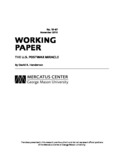The export option will allow you to export the current search results of the entered query to a file. Different
formats are available for download. To export the items, click on the button corresponding with the preferred download format.
A logged-in user can export up to 15000 items. If you're not logged in, you can export no more than 500 items.
To select a subset of the search results, click "Selective Export" button and make a selection of the items you want to export.
The amount of items that can be exported at once is similarly restricted as the full export.
After making a selection, click one of the export format buttons. The amount of items that will be exported is indicated in the bubble next to export format.


